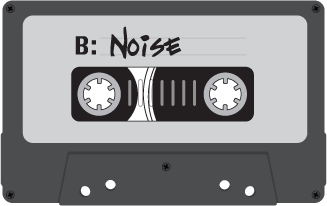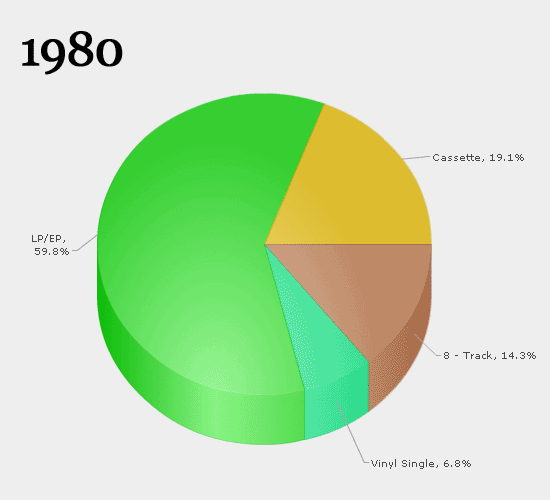 |
| Cassette, it's all your fault. Image from rpmdesignfactory.com |
Think of the word "media." We toss it around to refer to the music we hear, the movies and TV we watch, the words we read in books and newspapers. But "media" is actually that which that carries the thing we consume--the content. Historically, that was never an issue; you paid for the "paper," which represented both the physical newsprint you carried away from the newsstand and the content printed on the paper. You bought the CD, a physical piece of plastic, tightly bound to the music it contained. The delivery mechanism and the content were unbreakably linked. You knew you owned the content, because you owned the thing that carried it. Life was simpler.
Although in some ways it seems that the “who owns the rights to content” question is becoming more strident, it reflects changes in society and technology over the last 50 years. Audio and video cassettes gave us portability and time-shifting. CDs and DVDs introduced digitization of media, and broadband networks gave us ever-increasing ways to purchase, access, and share that digital content.
This is what happened to the purchase of music between the cassette era and now:
Although in some ways it seems that the “who owns the rights to content” question is becoming more strident, it reflects changes in society and technology over the last 50 years. Audio and video cassettes gave us portability and time-shifting. CDs and DVDs introduced digitization of media, and broadband networks gave us ever-increasing ways to purchase, access, and share that digital content.
This is what happened to the purchase of music between the cassette era and now:
Technology can now break the ties between ownership, delivery, and consumption of content. Content has become stateless. It is a service, not a thing.
The idea of stateless computing--that the content and applications we use every day should be decoupled from the devices we use to consume them--is one of the infrics.com “Big Ideas.” A book is no longer a physical thing you purchase and own as a "thing," it's a service you buy, and the physical "book" is just a manifestation of what you purchased. Stated that way, it's simply a reflection of the entire stateless/services concept. When you combine stateless content with the web and browser-centric operating systems like Google’s Chrome OS or virtualization of conventional desktops, applications themselves become part of the question. They do not reside in, nor depend on, a specific piece of equipment in order to provide their value.
An online friend posted a link to an insightful article from Technology Review, MIT's magazine of technology innovation: A Cloud Over Ownership. The article opens with this statement:
"Online services set content free from the physical world's constraints—including those that have defined the very idea of possession."
I believe this is a major trend; not only does it express societal and technological versions of the stateless and services-oriented future, I further believe that it is inevitable. There are business models fighting to preserve the old ties between content and consumption, but the writing is on the wall for their future. Businesses that seek to delay the inevitable will pay a high price; those who understand this future and take advantage of it will profit very handsomely.
Since ownership, delivery, and consumption of content have been rent asunder, let’s consider the implications for each:
Action Items:
An online friend posted a link to an insightful article from Technology Review, MIT's magazine of technology innovation: A Cloud Over Ownership. The article opens with this statement:
"Online services set content free from the physical world's constraints—including those that have defined the very idea of possession."
I believe this is a major trend; not only does it express societal and technological versions of the stateless and services-oriented future, I further believe that it is inevitable. There are business models fighting to preserve the old ties between content and consumption, but the writing is on the wall for their future. Businesses that seek to delay the inevitable will pay a high price; those who understand this future and take advantage of it will profit very handsomely.
Since ownership, delivery, and consumption of content have been rent asunder, let’s consider the implications for each:
| Winners | Losers | |
| Ownership Sales of content rights and management of those rights across differing consumption mechanisms has a big future. | RIghts aggregators and managers represent a new market opportunity. With granular rights management, any online music service would be freed of license costs when it streams me a song already in my personal library of purchased content. Same for any granular management of rights for already-purchased content--video, software, books, periodicals. | Any (read most) media or software company whose business model depends on you paying a premium for content based on their control of that content’s delivery and consumption mechanism |
| Delivery A la carte content, managed at a granular level, changes the whole idea of "broadcasting." The “mass media” idea central to broadcasting does not go away, but the need for a specific delivery vehicle--like a TV station or a cable company--does. | Supplying broadband IP connections, and management of those connections across many different access points and technologies, is big and will get much bigger. | Once content is separated from the means of delivery, the business model for cable and satellite TV companies is meaningless, although they could survive as IP network providers. For all practical purposes, so are the business models of local TV and radio beyond their role in creating purely local shows. |
| Consumption Things get very interesting when you talk about decoupling content from the devices traditionally used to license purchase and limit ownership rights. Content/consumption-linked business models (books, CDs and DVDs) will be increasingly challenged by stateless content ownership (digital purchase such as iTunes and Amazon) | Digital delivery storefronts: iTunes, Amazon.com, hulu Sirius/XM for their content & web delivery, and as an IP-via-satellite content delivery network | RIAA and MPAA, who have invested heavily in trying to preserve outdated license models. If they can position themselves as the way to make stateless content licensing work for artists AND users, they could have a bright future; otherwise they are likely to be disintermediated out of existence. ASCAP/BMI, who will have to restructure their licensing models to include management of individual ownership rights in addition to broadcast-linked agreements Sirius/XM for their one-license-per-tuner model |
Action Items:
- If you’re a business, your future software license models should reflect this trend: licensing of users, not devices. Be prepared to negotiate the difference between differential pricing for one-time or limited-time use and for ownership.
- For content purchasers, be mindful where the technology you use is heavily biased toward maintaining old profit models: proprietary formats for content (iTunes, Amazon Kindle for books, for example) are built to lock content, delivery, and devices together.
- Emerging purchase models are struggling to break free of legal restrictions and old business models. The future favors hulu, Amazon Video, Pandora, Spotify over traditional networks.
- Watch for prices to drop and flexibility to increase from traditional video content bundlers like Comcast and DirecTV; if they adopt a la carte channel purchases, they may survive. However, their “pay a lot for 350 channels, of which you watch 10” model is in serious trouble. They built their business on being the only way for you to access content; that isn’t true today.
- Conversely, network providers like Bravo and CBS will soon learn they are losing audience to people who no longer consume content the way they have been licensing it; you should soon have the ability to buy and receive any network directly over the internet.
- Your rights as a consumer are not fully realized yet, but they have been expressed, as the Digital Consumer’s Bill of Rights. Although the site has gone inactive, its founder, Graham Specer, blogs here.
When I began writing this article, I was full of righteous indignation about my rights as a consumer of content, and the ways the market has tried to withhold them; but in fact, that's beside the point and unnecessary.
Business will act to preserve its profits, but it will also have to deal with its own failures to pay attention to the future. The rights of users to buy content separately from its delivery and consumption will happen because ultimately, that's the business model we will purchase from. Whether the new model is delivered by an existing entity that evolves or by a new company that puts them out of business is still up for grabs.
Business will act to preserve its profits, but it will also have to deal with its own failures to pay attention to the future. The rights of users to buy content separately from its delivery and consumption will happen because ultimately, that's the business model we will purchase from. Whether the new model is delivered by an existing entity that evolves or by a new company that puts them out of business is still up for grabs.
I will say that as the people who will be paying for all that music, video, words, and applications, it's incumbent on us to understand how these new rules change the game, and demand whenever possible that our vendors acknowledge that. The more people who use Hulu Plus and say no to their cable company, the faster the inevitable will be here, and the better for both business and consumers alike. What do you think?

No comments:
Post a Comment